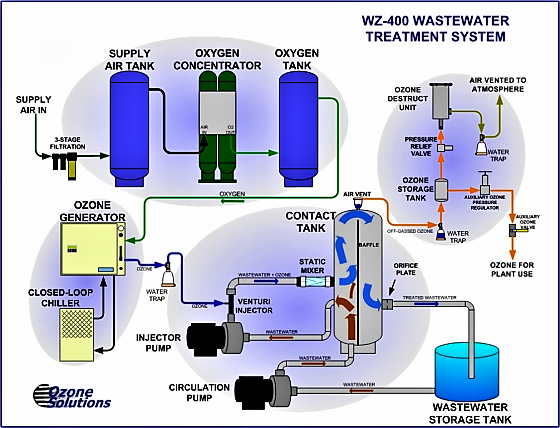Use of Ozone for wastewater treatment
INTRODUCTION:-
Use of ozone for wastewater treatment:-
The use of ozone to disinfect sewage is becoming increasingly important, especially when a high degree of treatment is required. Ozone is a strong disinfectant with a high oxidation potential and is one of the most effective ways of inactivating pathogens. In order to observe and evaluate the effect of this disinfectant on the physical, chemical and microbiological characteristics of wastewaters, we analyzed the effluent input and output of an ozone disinfection plant located in Almeria, southeast Spain. The ozone input rate is adjusted according to the residual ozone content in the effluent output. The effluent is currently reused to irrigate vegetable crops. Another objective of this study has therefore been to verify the adequacy of this water treated process for preparing water for this purpose. Among the results obtained, it is important to highlight the fact that the ozone disinfection treatment was sufficient to inactivate faecal coliforms. We achieved reductions in these pathogens of around 89%. This treatment was respectful towards elements that give the reuse of effluent an added value in irrigation (N, P, K, etc) and also kept the quality of the waters within the authorized limits. Thus, we achieved up to 88% removal of COD, a maximum 68% removal of BOD5 and up to 75% removal of suspended solids. Based on the results of the parameters analyzed in this ozonized effluent, we concluded that ozone-treated water is suitable for reuse in the irrigation of fresh consumption crops in accordance with the guidelines established in related legislation.

MAIN:-
In the last decade the application of ozone became more and more
popular. The development in technology of producing ozone and reaction
kinetics has made the process reliable in producing low cost ozone and
applying them to wastewater treatment problems. The application may be
solely ozonation, pre ozonation and post ozonation depending on the type
of wastewater and its physico-chemical properties. The field of
application increases tremendously because of its high oxidizing
character and no sludge problem. Most of the applications are more
viable and feasible. Ozone is powerful oxidant and is capable of
oxidative degradation of many organic and inorganic compounds. It is
soluble in water easily monitored; it readily decomposes to oxygen and
leaves no byproduct or residual toxic compounds. It is powerful
disinfectant. Ozone does not produce any secondary pollutants as
compared to chlorine which produces THM, chloramines and other toxic
compounds that are carcinogenic in nature. Many ozone reactions are
rapid in nature. A faster reaction means shorter contact time required
and large volume can be easily handled. The reactions with viruses are
so rapid that they are difficult to study analytically. It leaves behind
oxygen residual in wastewater that helps in further degradation. There
is no risk and toxicity and odour problem. Ozone is effective 25 times
more than hypochlorous acid, 2500 times more than hypochlorite and 5,000
times more than chloramines. All these excellent properties have made
ozonation more and more applicative in different fields of wastewater
and drinking water treatment. Ozone is widely used for treatment of
drinking water to improve taste, odour, colour, as disinfection and
biodegradability of impurities.
REFERENCES:-
https://link.springer.com/article/10.1007/s11269-011-9798-x
https://www.icontrolpollution.com/articles/application-of-ozone-in-the-treatment-ofindstrial-and-municipal-wastewater-.php?aid=45409
google-images

Good piece of information about wastewater treatment
ReplyDeleteAmazing piece of work!!!
ReplyDelete